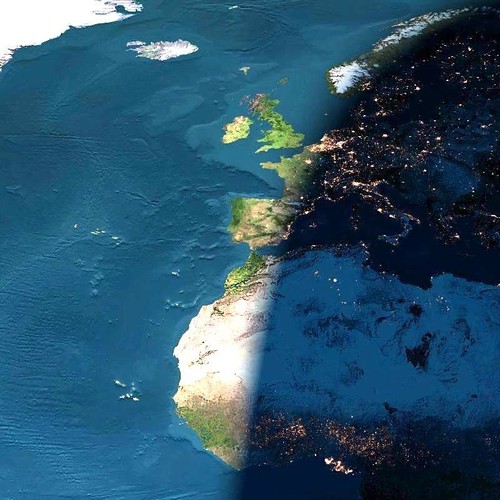Peaches, Light, and the Limits of human Awareness
Imagine a peach. (pause)

Not very hard, is it? A fraction of a second and you've got an image of a familiar fruit. You can build on the gestalt by deepening the peach qualia - conjuring the right ripeness, firm softness, fragrance, heft, warmth. Fruit is pretty sexy. You can go on to link all your associations with the fruit - past experiences, desserts, experiences of biting and slicing and tongue-juice-cheek-chewing.
It's a little harder to imagine the peach for what it really is. A multi-dimensional arborcultural cyclical process which begins with seed and sapling and ends with seed and soil. A peach is just a piece taken out of a broad context which is not only profoundly sequential in it's growth, blossoming, fruiting, ripening, and rotting, but also massively parallel as an expression of multivalent genetic, atmospheric, and botanical factors. Trillions of cells photosynthesizing and self-organizing to essentialize and concentrate the forms we read as fruit.






Our experience of light is another illuminating example of how our ordinary awareness is limited in ways that we cannot ordinarily conceive of. I'm extremely wary of the metaphysical/theological uses of 'Light' but the primordial experience of night and day does provide an enlightening illustration of how vast universes of vitally important information can be routinely hidden from us without much effort.
I can see why the 'Let There Be Light' metaphor was appealing to Bronze Age pastoralists, as the experie
nce of the dawn must have been such a universally powerful and familiar revelation...a hypnotic cue really, to sort of cleanse the mind of the reader of all previous beliefs like nocturnal superstitions to be banished in the concrete certainty of daylight.
It can be reasoned that if the human universe can be redeemed from total darkness in a matter of minutes, and if the human imagination can visualize objects in a fraction of a second, then the Cosmos itself could have come into existence in a matter of days, given an omnipotent creator. The sleight of hand here is how this explanation of light blinds the audience to the darkness that is created by this simplistic explanation. With the revelations of Biblical 'truths' come demonic fictions, cauterized curiosities, ablations of knowledge and understanding which threaten civilization to this day. Fanatical violence and prejudice born of prehistoric fears, ignorant and incurious minds left to wallow in the darkness of their own disbelief of it.

How different if the Genesis was 'Let there be doubt' or 'Let there be questions.' Which would really be a more useful and accurate metaphor, since, as we know, light does not create existence so much as it reveals existence. Darkness is the ephemeral illusion that masks it - that limits our awareness, yet without it we would be overwhelmed by the screaming cacophany of the Cosmos unbound. Without the attenuation provided by form, scale and distance, the Cosmos would be experienced as 'everything' 'all of the time' from every perspective at once.
This elevation of spiritual light is really about the worship of the warmth of one's own intellectual certainty. It's a bit smug. We'd like to think that the dawn brings to us complete comprehension of the Universe, that God/light is our special gift, our friend. A cursory glance at the history of human civilization should show you that God is not our friend, and that fearing God's wrath or petitioning for favor has not noticeably helped.
It could be argued, and it is, that 'God's Love' for us is, like the peachtree and the nighttime sun, hidden to us by veils of time and space - obscured by the inevitable loss of understanding as the thundering music of the infinite cosmos is collapsed into the tiny framework of a four dimensional topology which our limited neurology is scaled to perceive. Maybe. Maybe the staggering totality of the order of the universe beyond our perception is so alien that invoking divinity is no more ignorant than invoking the certainty of 21st century science.

Like the Bible, science begins with the investment in the certainty of it's own precepts. It is a method of inquiry which, in a Wizard of Oz behind the curtain fashion, seeks to scoop up all of the uncertainty in our world and plop it decisively in the 'subjective' category. The universe 'out there' becomes an infallible truth machine of objects and principles to which we have but to align our own conceptual framework. Science is the religion of synchronizing the mind to cohere to objective reason...amputating the psyche entirely and letting the orphaned Self run amok with inchoate impulses seeping rust into the gleaming iron edifice of post Enlightenment Science.
Is there a possibility for a science to exist which embraces doubt of itself as well as self-doubt? Can the human ego ever, finally, accept it's limited place in the universe? Like a peach or a sunset, just a thin slice of a reflection of something unimaginable rather than simply imagining the light of the human mind is all that's real.

Not very hard, is it? A fraction of a second and you've got an image of a familiar fruit. You can build on the gestalt by deepening the peach qualia - conjuring the right ripeness, firm softness, fragrance, heft, warmth. Fruit is pretty sexy. You can go on to link all your associations with the fruit - past experiences, desserts, experiences of biting and slicing and tongue-juice-cheek-chewing.
It's a little harder to imagine the peach for what it really is. A multi-dimensional arborcultural cyclical process which begins with seed and sapling and ends with seed and soil. A peach is just a piece taken out of a broad context which is not only profoundly sequential in it's growth, blossoming, fruiting, ripening, and rotting, but also massively parallel as an expression of multivalent genetic, atmospheric, and botanical factors. Trillions of cells photosynthesizing and self-organizing to essentialize and concentrate the forms we read as fruit.





Our experience of light is another illuminating example of how our ordinary awareness is limited in ways that we cannot ordinarily conceive of. I'm extremely wary of the metaphysical/theological uses of 'Light' but the primordial experience of night and day does provide an enlightening illustration of how vast universes of vitally important information can be routinely hidden from us without much effort.
I can see why the 'Let There Be Light' metaphor was appealing to Bronze Age pastoralists, as the experie

nce of the dawn must have been such a universally powerful and familiar revelation...a hypnotic cue really, to sort of cleanse the mind of the reader of all previous beliefs like nocturnal superstitions to be banished in the concrete certainty of daylight.
It can be reasoned that if the human universe can be redeemed from total darkness in a matter of minutes, and if the human imagination can visualize objects in a fraction of a second, then the Cosmos itself could have come into existence in a matter of days, given an omnipotent creator. The sleight of hand here is how this explanation of light blinds the audience to the darkness that is created by this simplistic explanation. With the revelations of Biblical 'truths' come demonic fictions, cauterized curiosities, ablations of knowledge and understanding which threaten civilization to this day. Fanatical violence and prejudice born of prehistoric fears, ignorant and incurious minds left to wallow in the darkness of their own disbelief of it.

How different if the Genesis was 'Let there be doubt' or 'Let there be questions.' Which would really be a more useful and accurate metaphor, since, as we know, light does not create existence so much as it reveals existence. Darkness is the ephemeral illusion that masks it - that limits our awareness, yet without it we would be overwhelmed by the screaming cacophany of the Cosmos unbound. Without the attenuation provided by form, scale and distance, the Cosmos would be experienced as 'everything' 'all of the time' from every perspective at once.
This elevation of spiritual light is really about the worship of the warmth of one's own intellectual certainty. It's a bit smug. We'd like to think that the dawn brings to us complete comprehension of the Universe, that God/light is our special gift, our friend. A cursory glance at the history of human civilization should show you that God is not our friend, and that fearing God's wrath or petitioning for favor has not noticeably helped.
It could be argued, and it is, that 'God's Love' for us is, like the peachtree and the nighttime sun, hidden to us by veils of time and space - obscured by the inevitable loss of understanding as the thundering music of the infinite cosmos is collapsed into the tiny framework of a four dimensional topology which our limited neurology is scaled to perceive. Maybe. Maybe the staggering totality of the order of the universe beyond our perception is so alien that invoking divinity is no more ignorant than invoking the certainty of 21st century science.

Like the Bible, science begins with the investment in the certainty of it's own precepts. It is a method of inquiry which, in a Wizard of Oz behind the curtain fashion, seeks to scoop up all of the uncertainty in our world and plop it decisively in the 'subjective' category. The universe 'out there' becomes an infallible truth machine of objects and principles to which we have but to align our own conceptual framework. Science is the religion of synchronizing the mind to cohere to objective reason...amputating the psyche entirely and letting the orphaned Self run amok with inchoate impulses seeping rust into the gleaming iron edifice of post Enlightenment Science.
Is there a possibility for a science to exist which embraces doubt of itself as well as self-doubt? Can the human ego ever, finally, accept it's limited place in the universe? Like a peach or a sunset, just a thin slice of a reflection of something unimaginable rather than simply imagining the light of the human mind is all that's real.